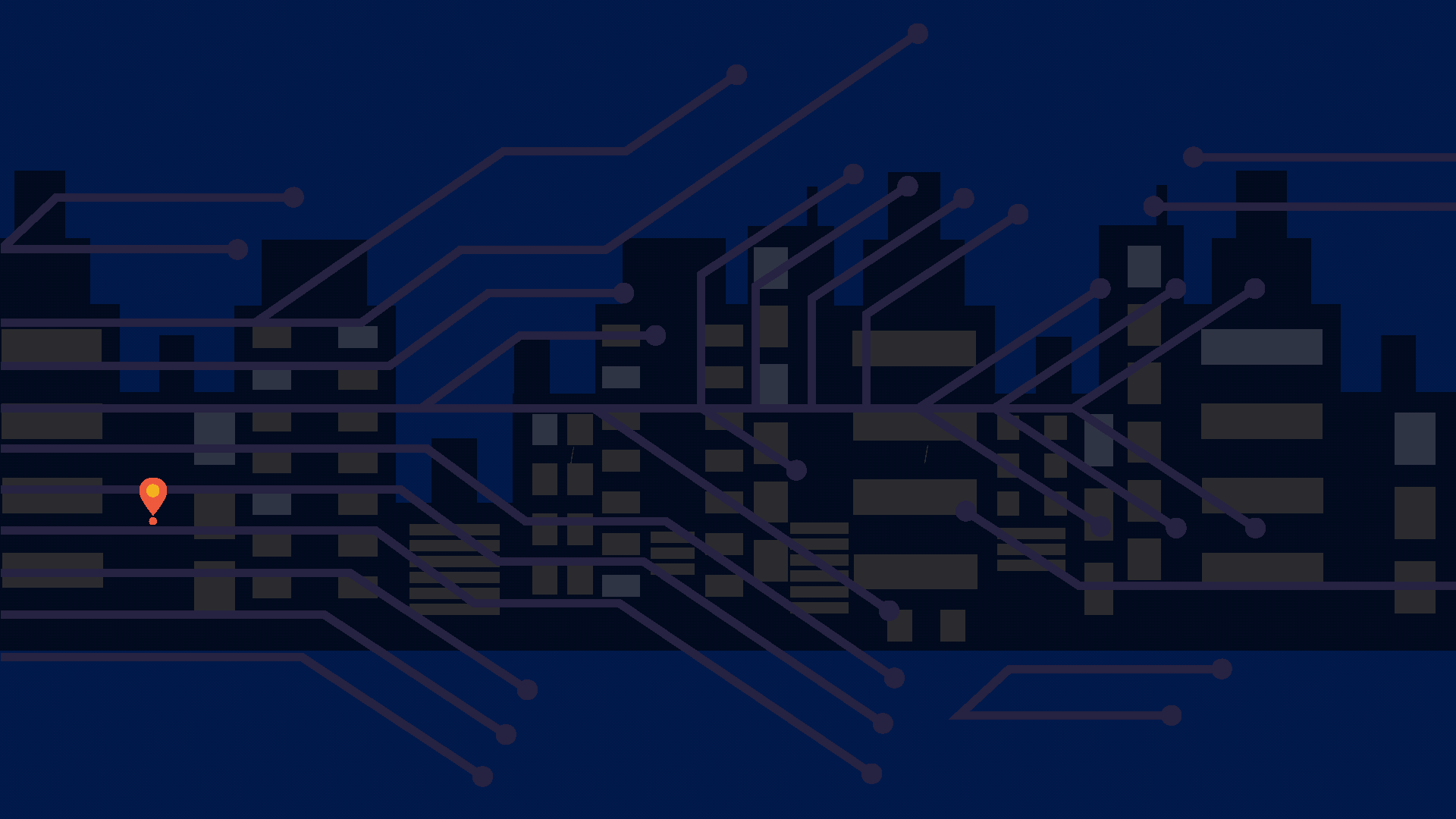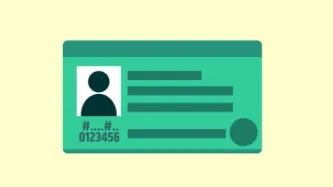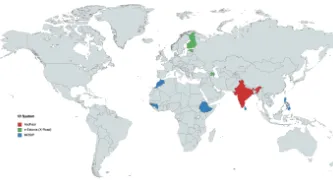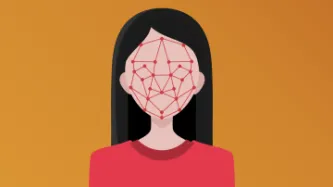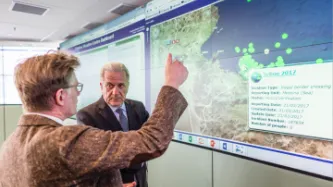Search
Content type: Video
Update: Pa has since won a settlement from UberPlease note the views expressed in the video are interviewee's own and do not necessarily reflect the views of PI.Pa used to work for Uber. After some time, Uber started asking him to submit a picture of himself to the platform to confirm it was indeed him who had completed the job. However, with time, the frequency of the requests increased. In the beginning, the requests for a picture only happened once a week, but as time went by Pa told us that…
Content type: Long Read
What if your boss was an algorithm? What would you do if your employer suddenly fired you or reduced your pay without telling you why? And without being willing to give you a reason when you ask for one?
This is not science fiction or some far-fetched reality. Millions of people worldwide are working in the gig economy sector for companies like Uber, Deliveroo, Bolt, Just Eat… And this could be the future of work for people working outside the gig economy, as surveillance technologies are…
Content type: Video
Please note the views expressed in the video are the interviewee's own and do not necessarily reflect the views of PI.
Driver X (he wishes to remain anonymous) has been working for Uber for five years. After working for Uber for two and half years, he suddenly received a message telling him that his account had been temporarily suspended and asking him not to call Uber while the investigation was pending. He was baffled, as he had an excellent record and rating, with plenty of positive…
Content type: Video
Please note the views expressed in the video are the interviewee's own and do not necessarily reflect the views of PI.
In his interview, Alexandru told us that he started to work for Uber in 2018. Despite being aware of negative experiences of others, he felt that everything was running smoothly, and for a while, Uber met his expectations.
However, in 2021, he received a notice from Uber that they had noticed fraudulent activity associated with his account. He went on social media and…
Content type: News & Analysis
What if we told you that every photo of you, your family, and your friends posted on your social media or even your blog could be copied and saved indefinitely in a database with billions of images of other people, by a company you've never heard of? And what if we told you that this mass surveillance database was pitched to law enforcement and private companies across the world?
This is more or less the business model and aspiration of Clearview AI, a company that only received worldwide…
Content type: Long Read
At Privacy International, we challenge companies and governments who infringe on our privacy and facilitate, as well, violations of other human rights.
Our most recent challenge is against Clearview AI, a company that trawls the internet to save photos of our faces to form part of their biometric database to sell. We have filed complaints alongside 3 other organisations with regulators in the UK, France, Italy, Austria and Greece. Our goal is a clear message that there is no place in society…
Content type: Case Study
This written piece is part of PI's wider research into the tech behind ID systems around the world. Click here to learn more.
Overview
Aadhaar (Hindi for ‘foundation’) is India’s ID programme, the largest in the world, surpassing 1 billion sign ups in just under 6 years. This programme aims to give every citizen a unique, biometrically-verifiable identification number. Each user receives a card with their number on it, which can be cross-referenced with the biometric data held in a government…
Content type: Long Read
Zimbabwe has a history of state led surveillance that is carried out more for political gain than for the investigation of legitimate criminal activities. During former President Mugabe’s 37 year rule the government used laws and state security structures to carry out targeted surveillance of persons of political interest and more generalised mass surveillance of the population.
Specific laws such as the Interception of Communications Act as well as mandatory SIM-card registration regulations…
Content type: Long Read
The smart city market is booming. And with a booming market comes companies that are profiting and reshaping our public space, like the Chinese tech company Huawei.
While the term ‘Smart City’ is a broad one that encompasses many different initiatives, some with little to no impact on our privacy and other rights. Certain issues are nevertheless recurrent: the lack of transparency around public-private partnerships, the absence of consultation, and the appetite for a “tech quick fix…
Content type: Examples
As a result of the challenges emerging from Covid-19 to disburse financial assistance, the government of Paraguay decided to change its food security programme, Ñangareko, from an in-kind benefit to a bank transfer consisting of a one-off payment of PYG 500,000 (= +/-73USD).
The Ñangareko Programme is aimed at those affected by Covid-19 which are stated to include the most vulnerable, informal workers, persons without a RUC (the unique taxpayer registry number) or social security, and who don’…
Content type: Long Read
For over 20 years with the start of the first use of ICTs in the 1990s, we have seen a digital revolution in the health sector. The Covid-19 pandemic significantly accelerated the digitalisation of the health sector, and it illustrates how fast this uptake can be and what opportunities can emerge; but also, importantly, the risks that it involves.
As we've said many times before, whilst technologies can be part of the solution to tackle some socio-economic and political challenges facing our…
Content type: Examples
Following the largest protests seen on the island in decades, Cuba’s government introduced new social media regulations that make inciting acts that alter public order a crime, and ordered ISPs to shut off access for those who “spread fake news or hurt the image of the state”. Critics believe the new rules are intended to curb dissent, as the protests spread across the island from a small town, where the first protest was convened in an online forum and spread via a Facebook livestream. Deputy…
Content type: Advocacy
Our environment is increasingly populated by devices connected to the Internet, from computers and mobile phones to sound systems and TVs to fridges, kettles, toys, or domestic alarms. There has been research into the negative safety and privacy impacts of inadequate security provided by the software in such devices (such as the creation of large scale botnets). This is also the case with outdated security, a risk enabled by software support periods that are shorter than a product’s usable life…
Content type: Long Read
Image source
This piece is a part of a collection of research that demonstrates how data-intensive systems that are built to deliver reproductive and maternal healthcare are not adequately prioritising equality and privacy.
Telemedicine describes the vast range of applications and technologies used to provide and manage healthcare remotely.
Telemedicine as its most basic refers to the transmission of data from a patient to a healthcare professional through a range of electronic…
Content type: Long Read
Governments around the world are increasingly making registration in national digital ID systems mandatory for populations, justifying its need on a range of issues from facilitating access to services, to national security and fighting against corruption. This is an attempt to create a "foundational identity" for an individual, or "a single source of truth" about who someone is, according to a government agency. These identity systems are run by governments, sometimes by private companies, or…
Content type: Long Read
In early August, the African Union (AU) issued a statement condemning Denmark’s Aliens Act which, among other things, allows Demark to relocate asylum seekers to countries outside the European Union while their cases are being processed.
The AU argues that this amounts to an abdication by Denmark of “…its international responsibility to provide asylum and protection to those that enter its territory…’’ More importantly, the AU says this is an “extension of the borders of such countries and an…
Content type: News & Analysis
Introduction
The European Parliament has adopted a nonbinding resolution against the use of artificial intelligence (AI) by law enforcement in public spaces and a ban on facial recognition databases, such as the ones used by Clearview AI.
It is a significant and hugely welcome step in an ongoing campaign to ensure the EU leads the world in protecting against dangerous applications of AI within its borders.
The Resolution recognises the need to safeguard against application of AI and mass…
Content type: Advocacy
Some of the most vulnerable groups in Mexico are amongst the groups at risk from a draft General Population Law that creates a biometric “Unique Digital Identity Card” (CUID), argue civil society organisations. The proposed law has now reached the senate, and has raised serious concerns from civil society organisations. Led by our global partner in Mexico Red en Defensa de los Derechos Digitales (R3D), PI along with 25 organisations have signed a joint letter to the members of the senate,…
Content type: Long Read
Image found here.
Founded in 1959, Bounty UK Limited markets itself as an information service for pregnant women and new mothers. Prior to the pandemic, it was best known for distributing “Bounty packs” of free samples of baby products to pregnant women at midwife appointments, to new mothers on maternity wards in the UK and through its digital presence via its website and app. Bounty representatives also sold new born photography packages to new mothers at the hospital bedside. Bounty entered…
Content type: Long Read
Introduction
Technology has driven a number of changes in the way that financial services are packaged and accessed by consumers. These changes have led to the rise of fintech, a data intensive industry that has been touted for its convenience and as an alternative to traditional financial services.
The current article looks at the use of digital loan Apps in Philippines and Kenya and contextualises the global discussions on fintech which we have been monitoring for some years. Research…
Content type: Advocacy
PI, together with 30 national and international civil society organisations (CSOs), release an open letter calling on Parliament and relevant stakeholders to halt and ban the use of live facial recognition technology (LFRT) by the police and private companies.We believe that the use of LFRT poses significant and unmitigable risks to our society. We do not believe that it can ever be safely deployed in public spaces or for mass surveillance purposes.The open letter comes as a result of a recent…
Content type: News & Analysis
After almost 20 years of presence of the Allied Forces in Afghanistan, the United States and the Taliban signed an agreement in February 2020 on the withdrawal of international forces from Afghanistan by May 2021. A few weeks before the final US troops were due to leave Afghanistan, the Taliban had already taken control of various main cities. They took over the capital, Kabul, on 15 August 2021, and on the same day the President of Afghanistan left the country.As seen before with regime…
Content type: Long Read
India’s Mother and Child Tracking System (MCTS) is a system that collects vast amounts of data about pregnant people, children, and families. It is an initiative by the Ministry of Health and Family Welfare in India, and was first trialled in 2009. It was then rolled out nation-wide in 2011. Its declared purpose, as stated in the press release accompanying it, was to facilitate “ensuring timely delivery of full spectrum of health care services to pregnant women and children up to 5 years of age…
Content type: Long Read
When you buy a brand-new low-cost phone, it’s likely to come pre-installed with insecure apps and an outdated operating system. What this means is that you or your loved ones could be left vulnerable to security risks or to having their data exploited. Privacy shouldn’t be a luxury. That’s why we advocate for companies to provide the latest security features and privacy protections for both low- and high-cost phones.
Content type: Advocacy
On 6 August 2021, the World Health Organisation (WHO) published its technical specifications and implementation guidance for “Digital Documentation of COVID-19 Certificates: Vaccination Status” (DDCC:VS) following months of consultations. As governments around the world are deploying their own Covid-19 certificates, guidance from the global health agency was expected to set a global approach, and one that prioritises public health. As such, we would expect the WHO to identify what these…
Content type: News & Analysis
Today Apple announced a set of measures aimed at improving child safety in the USA. While well-intentioned, their plans risk opening the door to mass surveillance around the world while arguably doing little to improve child safety.
Among the measures, Apple has announced that it is to introduce “on-device machine learning” which would analyse attachments for sexually explicit material, send a warning, and begin scanning every photo stored on its customers’ iCloud in order to detect child…
Content type: Long Read
For many, browsing the internet or checking social media comes with its fair share of being targeted with ads selling “fad diet” subscription-based programmes, magic weight-loss powders, or promising a secret trick to lose weight quickly. Some of the products and programmes sold have been described as scams, with a very real impact for those suffering from eating disorders and those who fall prey to these ads. This is even more problematic due to the Covid-19 pandemic, which has seen the…
Content type: News & Analysis
As Amnesty International and Forbidden Stories continue to publish crucial information about the potential targets of NSO Group’s spyware, we know this much already: something needs to be done.
But what exactly needs to be done is less obvious. Even though this is not the first time that the world has learned about major abuses by the surveillance industry (indeed, it’s not even the first time this month), it’s difficult to know what needs to change.
So how can the proliferation and use of…
Content type: News & Analysis
A new industry is offering border agencies around the world access to advanced space-based surveillance capabilities once reserved for the most advanced intelligence agencies. Using satellites able to track signals from satellite phones and other emitters, these companies are then selling access to the data obtained to anyone willing to pay, including UK and EU border agencies.
While such surveillance can and is being used to save lives, it can also be used for illegal ‘pull backs’ in…
Content type: Examples
In January 2021, the Indian Health Ministry officially allowed Aadhaar-based authentication when creating a UHID for identification and authentication of beneficiaries for various health IT applications promoted by the Ministry. This enabled the Co-Win portal, which is used to book COVID-19 vaccination appointments, to accept Aadhaar for authentication. As per Clause 2a of Co-Win’s privacy policy, “If you choose to use Aadhaar for vaccination, you may also choose to get a Unique Health ID…

